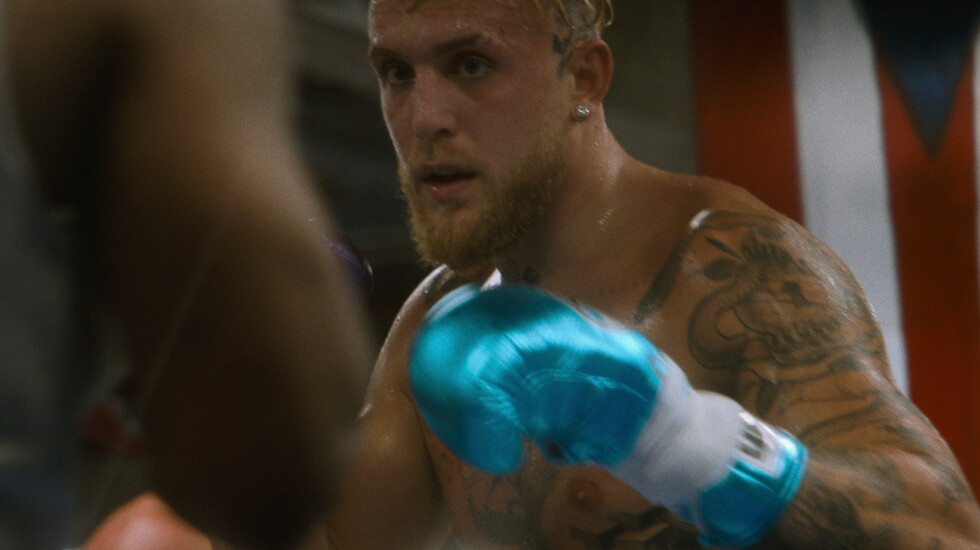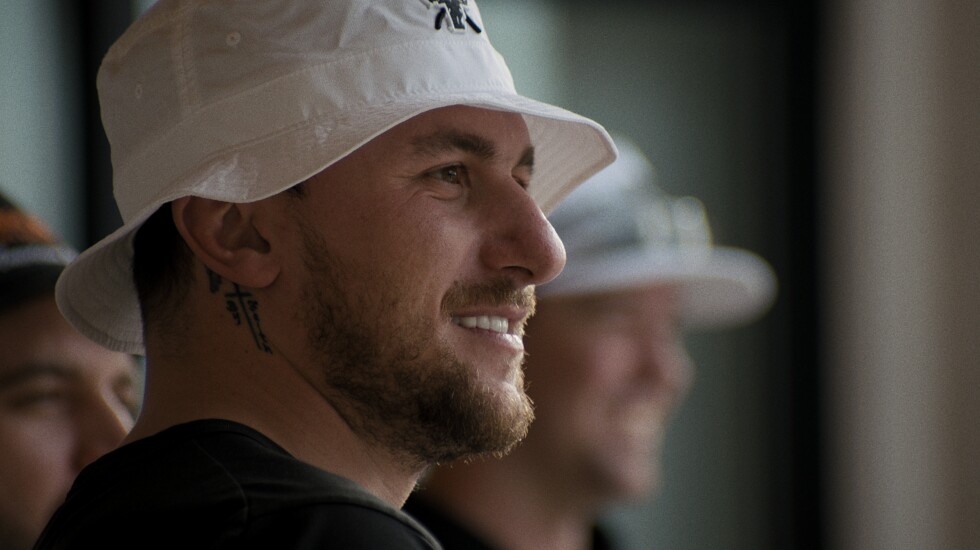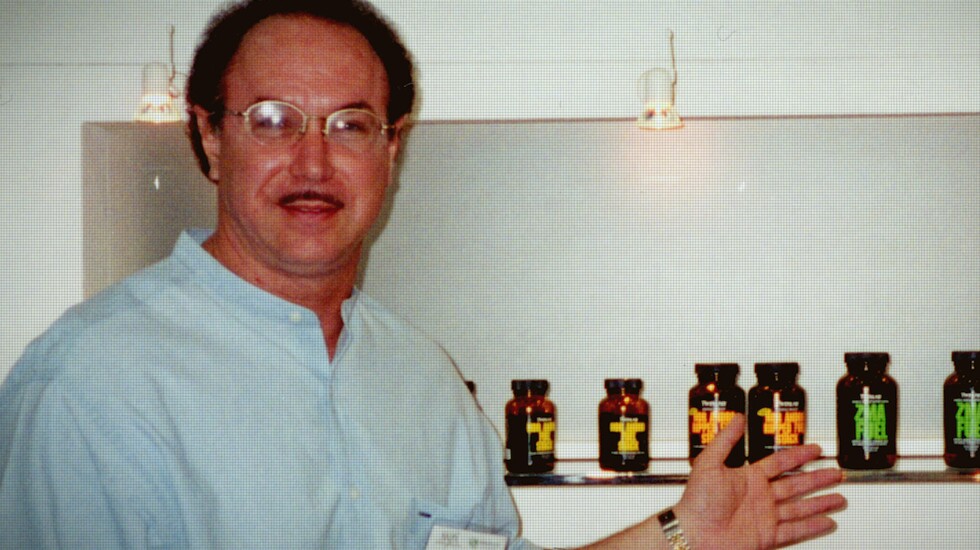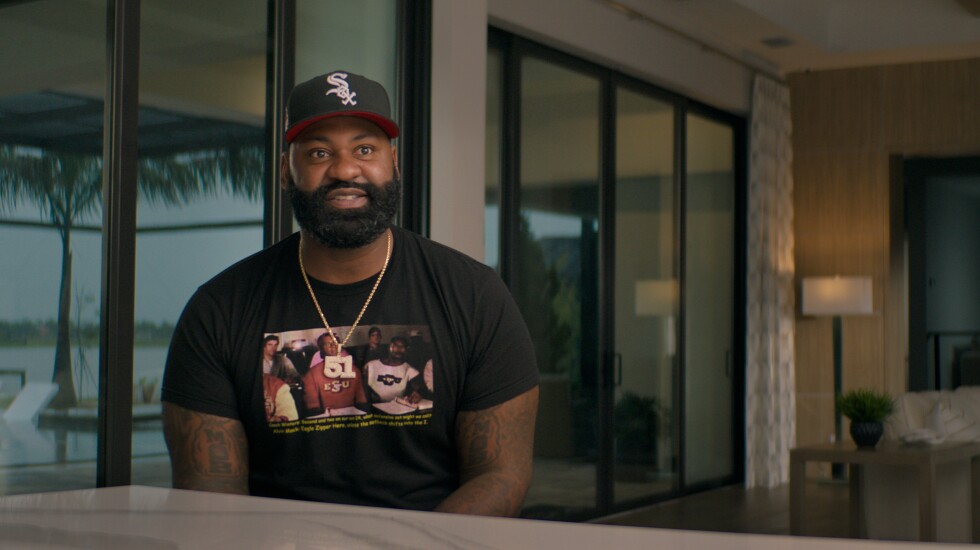
If you can’t stand the likes of Jake Paul, Johnny Manziel, Victor Conte from BALCO and the Florida Gators of the Urban Meyer era — well, the third edition of the Netflix sports documentary series “Untold” probably won’t change your mind, but you might gain a measure of empathy or at least a more thorough understanding of some of the subjects of these journalistically solid and thorough pieces.
This is a straightforward, traditional documentary series, relying on simple graphics, a treasure trove of news and highlight footage, and present-day interviews with a number of principal players in each chapter, from Jake and Logan Paul to Manziel and his parents to Victor Conte and onetime 100-meter record holder Tim Montgomery to Meyer and Tim Tebow.
Near the beginning of “Jake Paul the Problem Child” (premiering Aug. 1), Logan Paul, half of the infamous YouTube superstar bro duo, is delivering a speech prior to Jake Paul stepping into the ring for a boxing match. “Everyone in this room knows just how powerful of a being you are,” says Logan. “It’s why we’re all here, including Netflix … And one day, if I run for president, I’d be honored to have you as my vice-president …”
It’s the first but not the last time you’ll be rolling your eyes at the antics of the Paul brothers, who started making comedic home videos at their Westlake, Ohio, home as kids. By the time Jake Paul was 18, his videos had more than 2 billion views, he had moved to L.A. and been cast in a Disney Channel series and was worth millions.
“He bought a $7.4 million house at 18 years old,” says his father, Gregory, who later in the episode is accused by Logan of abusing the boys when they were young. (“Jake is still traumatized to this day about how my dad treated him,” says Logan.)
As Jake turns into an almost cartoonish villain figure through his often-troublesome behavior, we wonder: Does he have any real talent? Acting? Singing? Comedy? Rap? What is it? When Logan says, “We’re [bleeping] media whores who make content on phones, edit on iMovie, post ’em to the internet and get people talking,” he’s not wrong.
“It became a thing to hate Jake Paul,” says Jake, who then observes: “In the world of boxing, being the villain is the best thing.”
The episode chronicles Jake Paul’s controversial career as a fighter, with the traditional boxing world balking at the idea of some self-promoting YouTuber trying to break through while Paul defeats YouTubers, basketball player Nate Robinson and MMA fighters before losing a split decision but giving a respectable showing against Tommy Fury. Some boxing purists still refuse to take Paul seriously, but as Mike Tyson observes, the guy has pumped a ton of interest into a flailing sport, and he knows how to fill seats and deliver pay-per-views.
In the chapter titled “Johnny Football” (Aug. 8), we are reminded it was just 12 years ago when Manziel took the college football world by storm, becoming the first freshman to win the Heisman Trophy. “Johnny Football” had the world in his grasp — and then fumbled it all away with party after party after PARTY.

By the time Manziel left Texas A&M after his sophomore year and declared for the NFL draft (“I was bigger than College Station,” he tells us), a number of pro scouts had already soured on him for his immaturity and his endless nights on the town. By Manziel’s own admission, he never studied tape and he was woefully unprepared for the NFL game.
After two painful seasons with the Browns, a trip to rehab and an endless stream of TMZ videos capturing Manziel hitting the town on what he labels “a $5 million bender,” Cleveland released Manziel. His NFL career, such as it was, had come to an end.
“The wires in my head seemed very twisted,” reflects Manziel in present day. “[I was going to] to spend as much money as I could and then my plan was to take my life.” These days Manziel, still just 30 years old, says, “I love being the guy that got to do all these amazing things on and off the field … but at some point in time, you have to look back and think, ‘F---, was enough never enough?’ [Are] you just going to continue to go on living that frat-boy life for year after year after year? … And it’s been detrimental to where you wanted to go in life …”
Next in the lineup is an episode titled “Hall of Shame” (Aug. 15), in which Victor Conte Jr., founder and president of the Bay Area Laboratory Co-Operative aka BALCO, almost cheerfully recounts his part in the performance-enhancing drug scandals that resulted in Marion Jones and Tim Montgomery being stripped of records and medals, and Barry Bonds’ records forever including an asterisk in the minds of many. It’s startling to hear the details of “Project World Record,” in which a calendar was created outlining which days Montgomery would take PED’s in his quest to become the fastest man ever.

“It was thrilling,” admits Montgomery, who had been known as “Tiny Tim” before he muscled up from 148 to 176 lbs. “I felt like Conan the Barbarian.”
Indeed, Montgomery set the men’s 100-meter world record with a time of 9.78 seconds in 2002, but he was stripped of the mark a few years later.
“You become numb to what’s right and what’s wrong,” says Montgomery. “I wanted something so bad, at any price possible.”
Whereas the first three chapters in this season are stand-alone efforts, the fourth entry, “Swamp Kings” (Aug. 22) is actually a four-part series about Urban Meyer’s brief, hugely successful and sometimes controversial run as Florida’s football coach from 2005-2010. Meyer and former Florida stars including Tim Tebow, Brandon Siler, Steven Harris, Brandon James and Ahmad Black look back on a wild ride that included two national championships as players either bought into Meyer’s relentless drive or were invited to be on their way. Gainesville, Florida, became known as “Gaine-Vegas,” as players were treated like rock stars, with many of them taking full advantage of their status and many getting into trouble with the law. (Tim Tebow being one notable exception.)

“The parties were insane,” says Brandon Spikes. “Some of the stuff we were doing was insane. It’s just too much temptation.”
With the exception of Conte, this is one of the prime takeaways from “Untold”: that whether we’re talking about Jake and Logan Paul, Johnny Manziel or the star players for the Florida Gators, they were 18, 19, 20 years old when they entered a blinding spotlight, worshipped by their peers and people twice and three times their age, given every imaginable privilege and faced with constant pressure. The series doesn’t excuse anyone’s behavior but does provide invaluable context.







